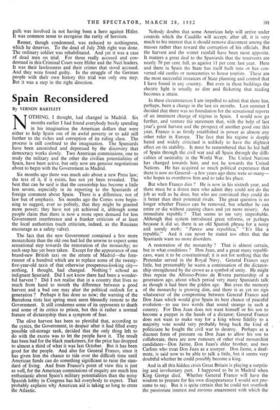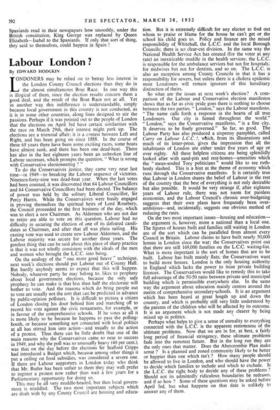Spain Reconsidered
By VERNON BARTLETT
NOTHING, 1 thought, had changed in Madrid. Six months earlier I had found everybody busily spending in his imagination the American dollars that were either to help Spain out of its awful poverty or to add still further to the riches and corruption of its ruling class. The process is still confined to the imagination. The Spaniards have been astonished and depressed by the discovery that democracy works slowly. Two American commissions, one to study the. military and the other the civilian potentialities of Spain, have been active, but only now are genuine negotiations about to begin with the Government in Madrid.
Six months ago there was much ado about a new Press law; the text of it, if it exists, has not yet been revealed. The best that can be said is that the censorship has become a little less severe, especially in its reporting to the Spaniards of foreign comment about Spain. There is a difference, not of law but of emphasis. Six months ago the Cortes were begin- ning to suggest, ever so politely, that they might be granted more power; they have not yet achieved it, although some people claim that there is now a more open demand for less Government interference and a franker criticism of at least the local authorities (such criticism, indeed, as the Russians encourage as a safety valve).
The fact that the new Government contained a few more monarchists than the old one had led the unwise to expect some sensational step towards the restoration of the monarchy; no such step has yet been taken. Except for the appearance of one brand-new British taxi on the streets of Madrid—the fore- runner of a hundred which are to replace some of the twenty- five-year-old taxis of that otherwise prosperous-looking city— nothing, I thought, had changed. Nothing ? echoed an indignant Spaniard. Did I not know there had been a wonder- ful harvest ? Did I not realise that in a country that lives so much from hand to mouth the difference between a good harvest and a bad one may alter the political outlook for a generation ? Perhaps it has done so now; the warning of the Barcelona riots last spring must seem blessedly remote to the Government. It still condemns some of its opponents to death and some of its critics to prison, but this is rather a normal feature of dictatorship than a symptom of fear.
The olive harvest has been so plentiful that, according to the cynics, the Government, in despair after it bad filled every possible oil-storage tank, decided that the only thing left to do with the excess was to let the people have it. The result has been bad for the black marketeers, for the price has dropped to almost a third of what it was last October. But it has been good for the people. And also for General Franco, since it has given him the chance to tide over the difficult time until American funds can do something significant to raise the stan- dard of living. And from Franco's point of view this is just as well, for the American commissions of enquiry are much less enthusiastic about Spain's military potentialities than the noisy Spanish lobby in Congress has led everybody to expect. That probably explains why American aid is taking so long to cross the Atlantic. Nobody doubts that some American help will arrive under controls which the Caudillo will accept; after all, it is very much to his interest that it should remove discontent among the masses rather than reward the corruption of his officials. But the harvest and the winter rainfall have been most apposite. It matters a great deal to the Spaniards that the reservoirs are nearly 70 per cent, full, as against 11 per cent. last year. Here and there in Spain the State has itself built inns or has con- verted old castles or monasteries to house tourists. These are the most successful instances of State planning and control that I have found in any country. But even in these buildings the electric light is usually so dim and flickering that reading becomes a strain.
In these circumstances I am impelled to admit that there has, perhaps, been a change in the last six months. Last summer I decided that there was no foundation for the sensational reports of an imminent change of regime in Spain. I would now go further, and venture the statement that, with the help of last year's good harvest and the prospect of another good one this year, Franco is as firmly established in power as almost any other ruler in Europe. The fact that his regime is deeply hated and widely criticised is unlikely to have the slightest effect on its stability. It must be remembered that he led half of Spain through the civil war and all Spain through the diffi- culties of neutrality in the World War. The United Nations has changed towards him, and not he towards the United Nations. He has acquired so much political experience that there is now no General—a few years ago there were so many— who hopes to overthrow him and to take his place.
But when Franco dies ? He is now in his sixtieth year, and there must be a dozen men who admit they could not do the job as well as he does, but who are convinced they could do it better than their potential rivals. The great question is no longer whether Franco can be removed, but whether he can retire or die without causing chaos and yet more misery. An immediate republic ? That seems to me very improbable. Although that system introduced great reforms, or perhaps because it did so, there is an old Spanish phrase for a noisy and unruly mob: " Parece una republica," "It's like a republic." And it can never be stated too often that the Spaniards want no more disorders.
A restoration of the monarchy ? That is almost certain, but in what conditions ? Don Juan, and a great many republi- cans, want it to be constitutional; it is not for nothing that the Pretender served in the Royal Navy. General Franco says little, but presumably he wants a continuation of the dictator- ship strengthened by the crown as a symbol of unity. He might thus repeat the Alfonso-Primo de Rivera partnership of a generation ago, about which period very many Spaniards talk as though it had been the golden age. But even the memory of the monarchy is growing dim, and there is as yet no sign whatsoever of the compromise between General Franco and Don Juan which would give Spain its best chance of peaceful evolution—to use two words that sound strange in such a country. For Don Juan does not want himself or his son to become a puppet in the hands of a dictator; General Franco does not want to make way for a king whose fidelity to a majority vote would very probably bring back the kind of politicians he fought the civil war to destroy. Perhaps as a discreet form of pressure on Don Juan to allow his son to collaborate, there are now rumours of other rival monarchist candidates—Don Jaime, Don Juan's elder brother, and two Carlists who treat Don Juan as a usurper. Don Jaime, a deaf- mute, is said now to be able to talk a little, but it seems very doubtful whether he could possibly become a king.
And in all this hidden crisis Great Britain is playing a surpris- ing and involuntary part. I happened to be in Madrid when King George died. Whether General Franco will have the wisdom to prepare for his own disappearance I would not pre- sume to say. But it is quite certain that he could not overlook the passionate interest and envious amazement with which the Spaniards read in their newspapers how smoothly, under the British constitution, King George was replaced by Queen Elizabeth—Isabel to the Spaniards. If only that sort of thing, they said to themselves, could happen in Spain !



































 Previous page
Previous page